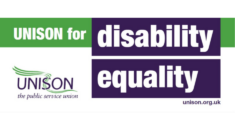The first session of this year’s UNISON’s women’s conference opened in Bournemouth this afternoon, with Catrina Murray for the national women’s committee asking delegates: “Remember that song, Things can only get better? I think we’ll find that things can get worse”.
December’s election victory for the Conservatives – and what it will mean for women – was a thread that ran through the afternoon’s business.
While continued austerity and pain was the major expectation, there was also a determination to fight back, harder than ever.
Benefits was just one area that this related to.
Ms Murray noted that most experts agree that, “in half of all claims, people are worse off under universal credit.”
As a branch officer trying to help members, she cited the case of “a young woman member who had to downgrade her post and reduce her hours in order not to be penalised financially after leaving an abusive relationship”.
People were “going through hell.”
For the national LGBT+ committee, Jackie Lewis said that UN rapporteur on extreme poverty, Philip Alston, found that, in the UK, “14 million – a fifth of the population – are in poverty”, while a Joseph Rowntree foundation report has shown that, in 2018, the number of working people in poverty had risen for the third year in a row.
Conference called for work across the union to build a body of evidence to show the harm universal credit is having on low-paid women, and to work with the Labour Link to lobby for the scraping of universal credit and its replacement with a benefit that allows women to work without being penalised.
Social care crisis
Conference also discussed the crisis in social care – affecting care workers, unpaid carers and those needing care.
Jane Gebie for the national women’s committee stated that “more people need more care – and are not getting what they need”.
Delegates heard that estimates from local government reveal a £3.5bn gap in funding, while 80% of health and social care workers in the UK are women.
Ms Lewis stressed the need to “campaign for a national care service that provides care, free at the point of delivery” and also highlighted the success of UNISON’s Ethical Care Charterin pushing the issues onto the agenda.
It was crucial to work for “an end to care by the minute and care by the pound.”
Delegates agreed that the lack of children’s and young people’s provision – including Sure Start – increases the problems for those providing care.
Sarah Davies from Cymru/Wales said that the “client-to-carer ratio is far too high … and vulnerable people do not get the care they deserve.
“Nine out of 10 councils in the UK are not paying enough to support elderly and disabled people in their own homes.”
For the national retired members, Rosie McGregor highlighted the “scandal” of one of the world’s richest nations failing to fund social care properly.
“The message seems to be: if you are in need of care, you are of no value.”
It was little wonder that the turnover of care workers is so high.
Taking money from the poor to give to the rich
Speaking to a motion on the impact of welfare cuts to women, Sonia Graham from Northern Ireland said that “welfare reform, means taking money from the poor to give to the rich.”
She pointed out that working mothers in Northern Ireland do not get the same level of childcare other mother’s get elsewhere in the UK – 30 hours free – while childcare is also more expensive in that part of the UK.
And another delegate from Northern Ireland said that, for working women there, it was a case of: “politicians have plenty – our purses are empty.”
Conference also debated motions calling for more time off to care for dependents – something that primarily affects women – and parity in shared parental leave, which has very low take-up.
Delegates discussed the menopause, examining both why it is a workplace issue and good practice concerning the issue, together with the particular impact of the menopause on Black women.



